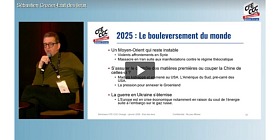Rapprochement Orange Espagne / MásMóvil : s’unir ou sortir ?
Rédigé par Hélène MARCY le . Publié dans Comité Groupe Europe+Monde.
Dans le cadre de la réunion du Comité de Groupe Européen d'Orange des 28,29 et 30 juin 2022 à Bruxelles, les représentants des personnels européens devaient rendre un avis sur le projet de Joint-Venture entre Orange Espagne et MásMóvil, pour lequel l’entrée en négociation exclusive a été annoncée le 8 mars dernier. La présentation et la réponse aux questions du Comité étaient assurées par Mari-Noëlle JEGO LAVEISSIERE, Directrice Générale Adjointe en charge de l’Europe, Fabien INGLESE, Julien RAULT et Silvain FOCK-YEE, de l’équipe des fusions-acquisitions d’Orange, et Jean-Michel POULALION, Vice-Président Europe en charge des Ressources Humaines.
On le sait, Orange est à la peine depuis 2019 sur un marché espagnol hyperconcurrentiel, avec 4 opérateurs (Telefonica, Orange, Vodafone et MásMóvil), et une multitude de marques régionales et/ou low-cost.
Selon la Direction d’Orange, les mesures drastiques engagées en 2021 ne seront pas suffisantes pour restaurer la profitabilité, alors qu’Orange Spain a déjà connu deux plans sociaux (435 départ en 2016 après le rachat de Jazztel et près de 400 en 2021, dans le cadre d’une rationalisation du portefeuille des marques commercialisées par Orange en Espagne). Le rapprochement d’Orange Spain avec un autre acteur lui apparaît dès lors comme la seule solution pour sortir de l’ornière. Comme l’a souligné Jean-François Fallacher, actuel CEO d’Orange Spain, MásMóvil serait le meilleur choix pour assurer la réussite du nouvel ensemble.
Sur le papier, l’alliance avec MásMóvil présente des aspects positifs, en raison notamment de la complémentarité entre les deux opérateurs :
- MásMóvil ne possède pas de réseau : il utilise essentiellement ceux d’Orange ;
- L’association des deux opérateurs permet de couvrir tous les segments de marché (Orange essentiellement sur le segment Premium, MásMóvil sur le low-cost) ;
- MásMóvil aurait également de bonnes compétences IT qui seront utiles au nouvel ensemble ;
- Enfin, aucun des deux acteurs ne possède de réseau de boutiques en propre, seulement quelques-unes qui seront en principe conservées, car elles permettent de maintenir la connaissance des comportements clients.
Selon la Direction, cette complémentarité permet donc de limiter les suppressions de postes : seules les fonctions managériales redondantes seraient concernées… ce qui n’est cependant pas rien aux yeux des représentants des personnels.
Elle pose aussi de nombreuses questions sur la capacité de deux entreprises aux profils aussi antinomiques (un opérateur possédant ses infrastructures réseau / un acteur « ultra léger », dont les actifs télécoms sont essentiellement des licences et des contrats d’accès aux réseaux d’autres opérateurs) à se rapprocher avec succès.
Le dossier présenté au Comité de Groupe présente également de nombreuses zones d’ombre. Certaines sont liées aux clauses de confidentialité qui encadrent la préparation d’opérations de rapprochement entre deux entreprises concurrentes, et qui pourraient le rester si le projet n’aboutit pas. On ne connaît pas non plus les « remèdes » susceptibles d’être exigés par les autorités de la concurrence, particulièrement la Commission européenne, pour valider ce rapprochement. Il seront prononcés au mieux en juin 2023, plusieurs mois après la signature par les deux acteurs de leur engagement irrévocable dans l’opération, et la configuration inhabituelle de ce rapprochement rend tout pronostic particulièrement difficile quant à leur nature et à leur ampleur.
L’expertise réalisée par le cabinet Peritus suite à la demande des élus a en outre mis le doigt sur une épineuse question : la dette de MásMóvil, actuellement de l’ordre de 6 milliards d’euros, sera vraisemblablement mise à la charge du nouvel ensemble, dans des conditions et pour un montant final qui ne nous ont pas été précisés dans le cadre de cette information-consultation. Précisons qu’actuellement, Orange Spain n’a pas de dette dans ses comptes, celle-ci étant intégrée dans la dette globale portée par le Groupe.
MásMóvil est principalement détenu par 3 fonds d’investissement (Providence, Cinven et KKR), dont l’objectif essentiel est de récupérer leur mise avec une plus-value, pas forcément d’exploiter dans la durée un opérateur de télécommunications… ni de verser cash l’écart de valeur constaté entre les deux acteurs pour finaliser le rapprochement, qui a sans doute plutôt pour but de récupérer tout de suite une partie du capital engagé. Orange a au contraire manifesté son intention de rester présent en Espagne, ce que traduit la possibilité pour le Groupe de prendre le contrôle en cas de mise en bourse du nouvel ensemble. C’est donc Orange qui devra rendre ses activités profitables dans la durée. Sera-ce possible en assumant la charge de la dette issue du rapprochement avec MásMóvil ?
Il n’est sans doute pas inutile de rappeler les épisodes précédents : l’essor de MásMóvil est notamment le résultat des engagements imposés à Orange Spain par la Commission européenne lors du rachat de Jazztel en 2015, qui ont entre autres permis à MásMóvil d’accéder au réseau mobile d’Orange… dans des conditions financières suffisamment avantageuses pour lui permettre de tailler des croupières à Orange, en particulier sur le segment « low-cost ». C’est ce qui explique en large partie pourquoi Orange Spain, qui fut pendant quelques années l’un des fleurons du Groupe en Europe, a vu ses résultats se dégrader fortement. Sept ans après, Orange Spain et MásMóvil cherchent à se rapprocher, mais il est légitime de se demander qui au fond rachète l’autre, puisque la dette de MásMóvil sera portée par le nouvel ensemble.
Au vu des éléments présentés dans le dossier et des étapes restant à parcourir avant la mise en œuvre effective de l’opération, il était presque impossible pour les membres du Comité de Groupe européen d’avoir une évaluation claire des impacts économiques et sociaux de ce projet :
- Permettra-t-il de retrouver une situation économique saine dans la durée ?
- Évitera-t-il de nouveaux plans sociaux comme la filiale en a déjà connus ?
- N’est-ce pas in fine la culture « low-cost » de MásMóvil qui l’emportera dans le nouvel ensemble, avec une forte pression sur les équipes qui devront accroître les profits pour absorber la dette, avec à la clef une dégradation de leurs conditions de travail ?
Pour l’ensemble de ces raisons, le Comité de Groupe européen a rendu un avis négatif sur cette opération. Ses membres ont également demandé à la Direction de s’engager à lui donner le maximum de visibilité sur les évolutions intervenant entre la demande d’avis et le « signing » proprement dit (qui devrait intervenir d’ici fin juillet) :
- Information en cas de modifications mineures ayant peu ou pas d’impact sur la confirmation des accords entre les propriétaires d’Orange et de MásMóvil et plus généralement le projet tel qu’il nous a été présenté ;
- Consultation en cas de modifications majeures susceptibles d’impacter les termes de l’accord ou les conséquences économiques et sociales du projet.
Ils revendiquent enfin un droit d’information sur le suivi de l’opération : si en raison de la forme du rapprochement (joint-venture à 50/50), le nouvel ensemble échappe théoriquement au droit de regard qui leur est conféré par la réglementation européenne, ils ont mis l’accent sur la nécessité pour la Direction d’Orange de faire preuve de transparence et de loyauté, seules garantes d’un dialogue social de qualité dont se réclame par ailleurs la Direction du Groupe.
[English version]
Orange Spain / MásMóvil merger: unite or leave?
As part of the meeting of Orange's European Works Council on June 28th, 29th and 30th, 2022 in Brussels, European staff representatives were to give an opinion on the joint venture project between Orange Spain and MásMóvil, for which the entry into exclusive negotiations was announced on March 8th. The presentation and the answer to the Committee's questions were provided by Mari-Noëlle JEGO LAVEISSIERE, Deputy General Manager in charge of Europe, Fabien INGLESE, Julien RAULT and Silvain FOCK-YEE, from the mergers and acquisitions team of Orange, and Jean-Michel POULALION, Vice-President Europe in charge of Human Resources.
As we know, Orange has been struggling since 2019 in a hypercompetitive Spanish market, with 4 operators (Telefonica, Orange, Vodafone and MásMóvil), and a multitude of regional and/or low-cost brands.
According to Orange management, the drastic measures taken in 2021 will not be sufficient to restore profitability, while Orange Spain has already experienced two social plans (435 departures in 2016 after the acquisition of Jazztel and nearly 400 in 2021, as part of a rationalization of the portfolio of brands marketed by Orange in Spain). The merger of Orange Spain with another player therefore appears as the only solution to get out of the rut. As Jean-François Fallacher, current CEO of Orange Spain, pointed out, MásMóvil would be the best choice to ensure the success of the new entity.
On paper, the alliance with MásMóvil has positive aspects, in particular due to the complementarity between the two operators:
- MásMóvil does not have a network: it mainly uses those of Orange;
- The association of the two operators makes it possible to cover all market segments (Orange mainly on the Premium segment, MásMóvil on the low-cost);
- MásMóvil would also have good IT skills which will be useful to the new entity;
- Finally, neither of the two players has its own network of stores, only a few that will in principle be retained, as they make it possible to maintain knowledge about customer behavior.
According to the Management, this complementarity therefore makes it possible to limit job cuts: only redundant managerial functions would be concerned... which is however not nothing in the eyes of the staff representatives.
It also raises many questions about the capacity of two companies with such contradictory profiles (an operator with its own network infrastructure / an "ultra-light" player, whose telecom assets are essentially licenses and access contracts to the networks of other operators) to approach successfully.
The file presented to the Group Committee also presents many gray areas. Some are linked to confidentiality clauses which govern the preparation of merger operations between two competing companies, which could remain so if the project does not succeed. We also do not know the "remedies" likely to be required by the competition authorities, particularly the European Commission, to validate this merger. They will be pronounced at best in June 2023, several months after the signing by the two players of their irrevocable commitment into the operation, and the unusual configuration of this merger makes any prognosis particularly difficult as to their nature and extent.
The expertise carried out by Peritus following the request of the elected officials also put the finger on a thorny question: the debt of MásMóvil, currently of the order of 6 billion euros, will probably be charged to the new joint venture, under conditions and for a final amount that were not specified to us in the context of this information-consultation. It should be noted that currently, Orange Spain has no debt in its accounts, which is included in the overall debt carried by the Group. MásMóvil is mainly owned by 3 investment funds (Providence, Cinven and KKR), whose main goal is to recover their stake with a capital gain, not necessarily to operate a telco over the long term... nor to pay cash the difference in value observed between the two players to finalize the merger, which is probably more intended to immediately recover part of the capital involved by the funds. On the contrary, Orange has expressed its intention to remain in Spain, which is reflected in the possibility for the Group to take control in the event of the new group being listed on the stock market. It is therefore Orange that will have to make its activities profitable over the long term. Will this be possible by assuming the burden of the debt resulting from the merger with MásMóvil?
It is undoubtedly useful to recall the previous episodes: the rise of MásMóvil is in particular the result of the commitments imposed on Orange Spain by the European Commission during the acquisition of Jazztel in 2015, which, among other things, enabled MásMóvil to access the Orange mobile network… under sufficiently advantageous financial conditions to allow him to put a spoke in Orange’s wheel, in particular on the “low-cost” segment. This largely explains why Orange Spain, which for a few years was one of the Group's flagships in Europe, saw its results deteriorate sharply. Seven years later, Orange Spain and MásMóvil are seeking to merge, but it is legitimate to wonder who is actually buying the other, since MásMóvil's debt will be borne by the new entity.
In view of the elements presented in the file and the steps still to be taken before the effective implementation of the operation, it was almost impossible for the members of the European Works Council to have a clear assessment of the economic and social impacts of this project :
- Will it make it possible to restore a healthy economic situation over time?
- Will he avoid new social plans such as the subsidiary has already experienced?
- Is it not ultimately MásMóvil's "low-cost" culture that will prevail in the new entity, with strong pressure on the teams who will have to increase profits to absorb the debt, with a deterioration their working conditions?
For all of these reasons, the European Works Council issued a negative opinion on this operation.
Its members also asked the Management to commit to giving it maximum visibility on the developments occurring between the consultation and the "signing" itself (which should take place by the end of July):
- Information in the event of minor modifications having little or no impact on the confirmation of the agreements between the owners of Orange and MásMóvil and more generally the project as it was presented to us;
- Consultation in the event of major modifications likely to impact the terms of the agreement or the economic and social consequences of the project.
Finally, they claim a right to information on the follow-up of the operation: if due to the form of the merger (50/50 joint venture), the new entity theoretically escapes the right of inspection conferred on them by the European Union regulations, they emphasized the need for Orange management to demonstrate transparency and loyalty, the only guarantees of quality social dialogue to which the Group's management also proclaims.
Economie et Réglementation des Télécoms Emploi & Métiers Europe et International Comité Groupe Europe










